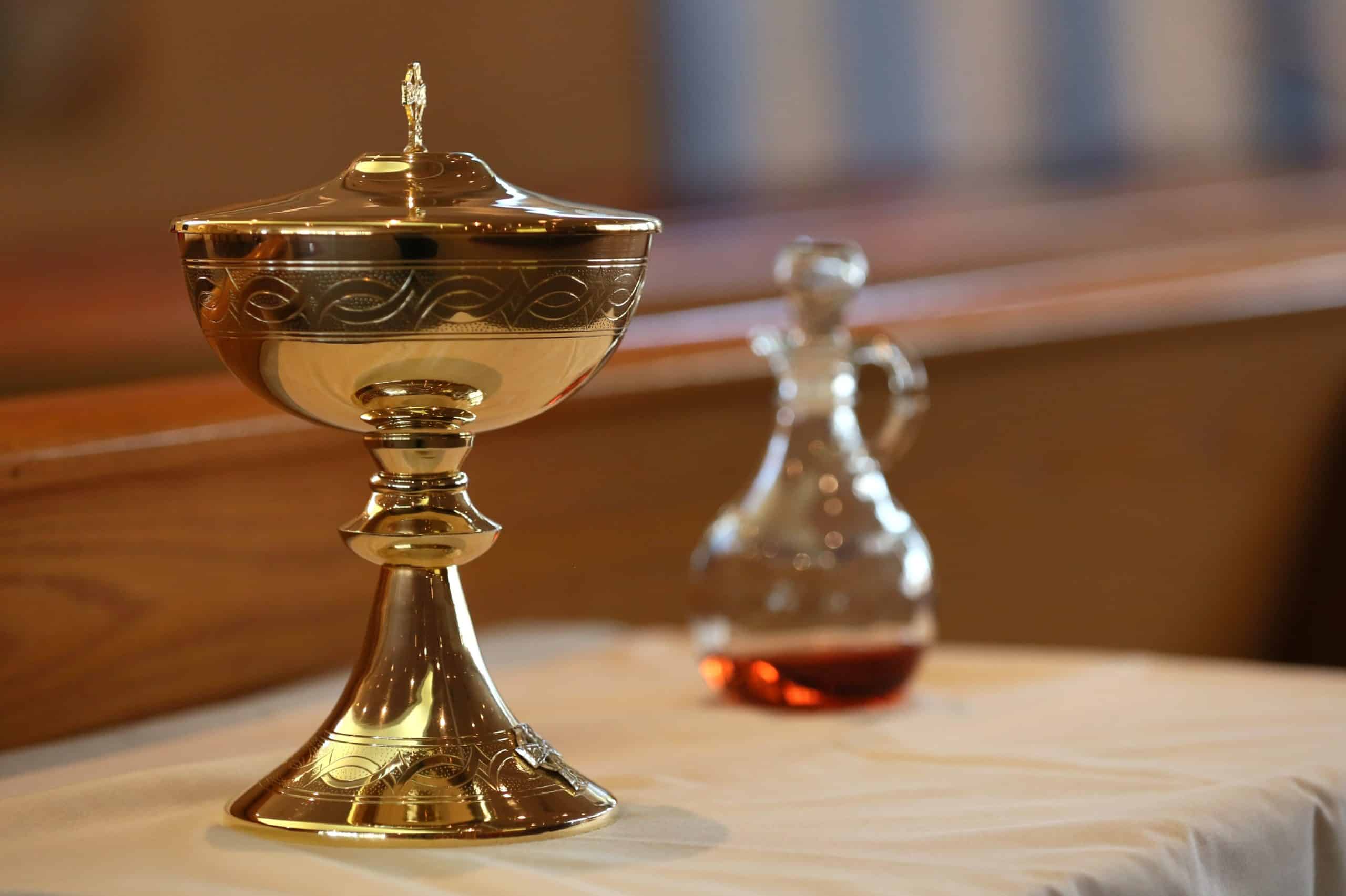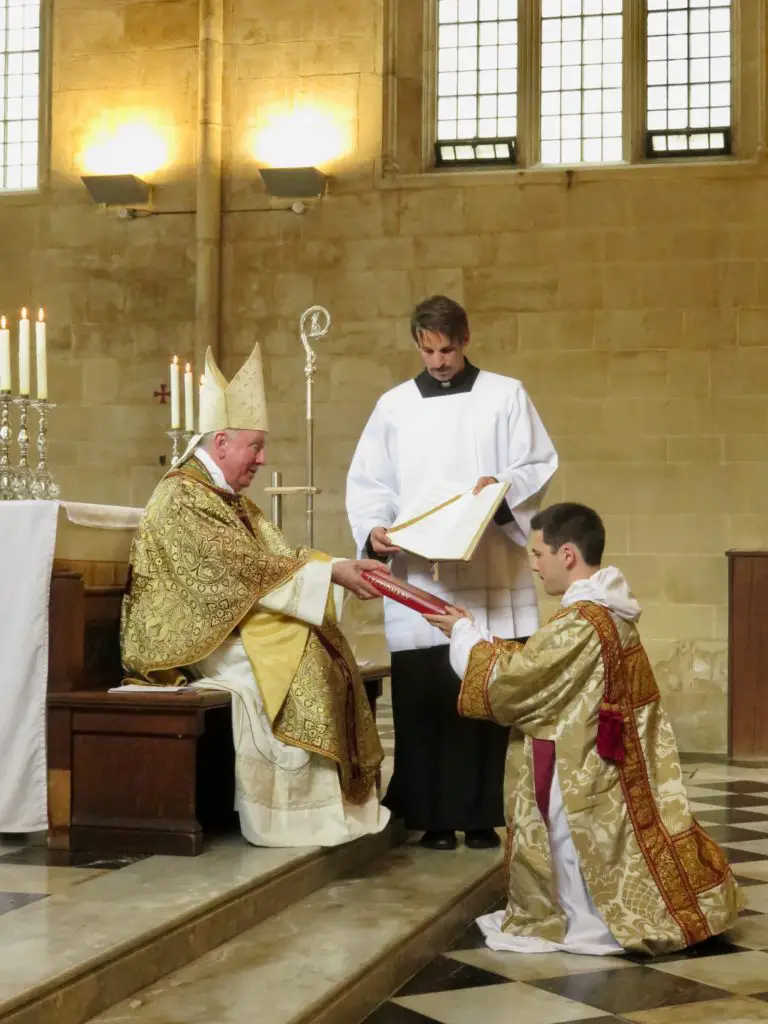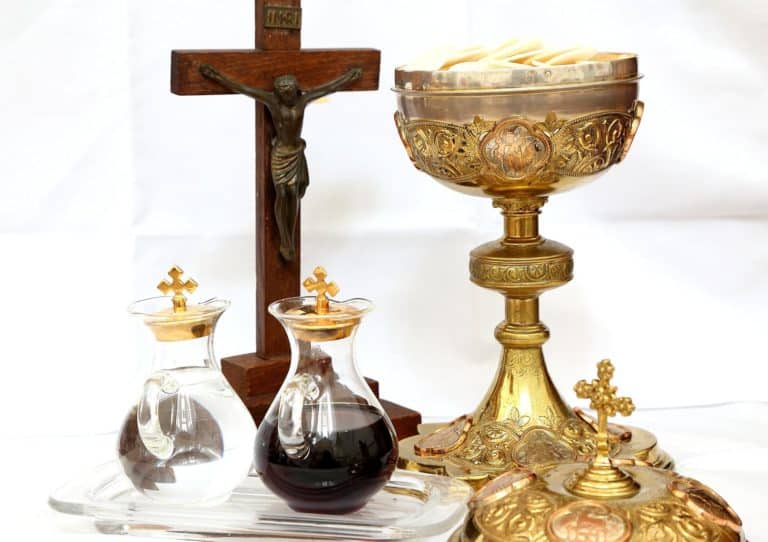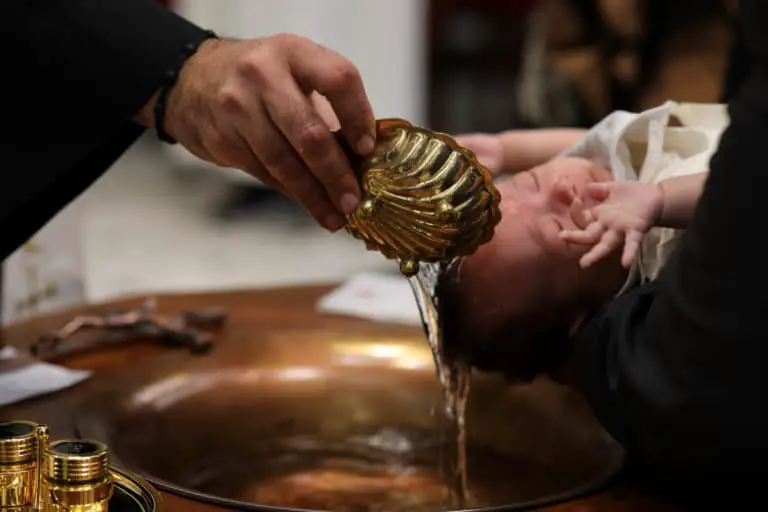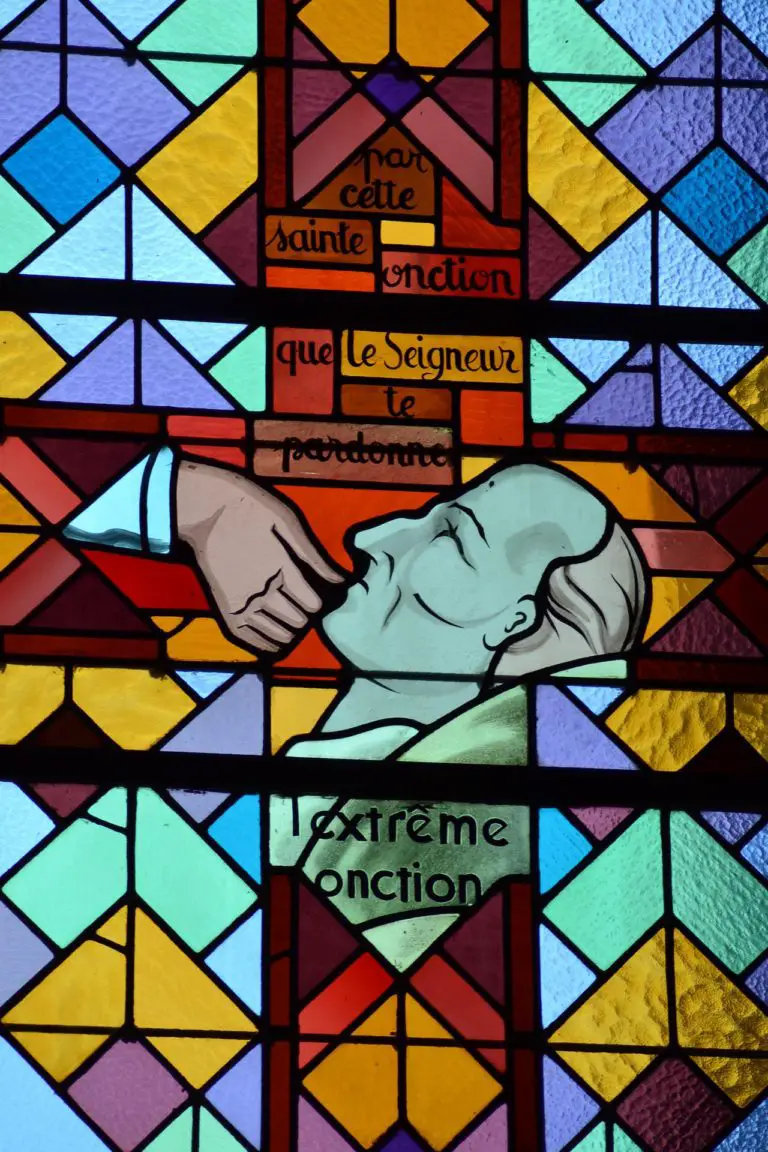What is a ‘Sacrament’?
Sacraments are efficacious signs in that they cause what they signify – sacredness and connect with our sanctification and salvation. Sacrament produce in the recipient grace. The Sacraments were instituted by Jesus Christ and there are Seven Sacraments
A Sacrament from the Latin word sacramentum is something to be kept sacred, a secret and mysterious and understood by the Latin speaking Church Fathers. The Greek speaking Fathers of the Church used the word mystērion mystery. These understandings are consistent with the Scriptures. Sacraments then are sacred signs or mystical signs that produce grace necessary for our salvation.
What is the definition of a ‘Sacrament’?
With all this in mind, we can therefore offer a definition of a Sacrament, prior to discussing each of the separate sacrament in seven articles.
One fundamental element that is critical in the reception of a Sacrament is that of Grace and crucial to our salvation. Therefore, a sacrament is a visible sign of an invisible grace, instituted for our justification. It would assist greatly to help understand what is Grace.
What is ‘Grace’?

Theologically, Grace describes God’s primary activity in the work of salvation through the Old Testament and then through His only Son, Jesus Christ.
The root of the word comes from the Hebrew חנן (ḥnn) and includes the verb חָנַן (ḥānan, “to show favor to” (Genesis 33:11), the noun חֵן (ḥēn, “favor” (Psalm 84:11), and the adjective חַנּוּן (ḥannûn, “gracious” (Psalm 112:4)
The Septuagint, which is the Greek translation of the Hebrew Scriptures makes use of the word Grace in the following ways:
In addition, the Septuagint uses charis to denote related terms:
- רָצוֹן (rāṣôn, “what is acceptable”),
- חֶסֶד (ḥesed, “loving-kindness”),
- רָחַם (rāḥam, “mercy”),
- טוֹב (ṭôb, “a good thing”),
- גְּדוּלָּה (gĕdûllâ, “greatness”).
Still further, within the writings of the New Testament, where the writings are Greek in origin, the Greek noun χάρις (charis, “grace” (St Luke 2:40) is used in relation to the Annunciation.
In all, the word Grace is in reference to God favouring or acting on or towards someone or giving of a gift or showing favour or compassion.
This makes our definition of Sacrament a little clearer.
St Thomas Aquinas reminds us that:
“Since therefore grace does not destroy nature, but perfects it, …”
Grace is the building of our human nature to perfection. It is through the actions of Jesus as part of God’s plan of salvation that Jesus institutes these Seven Sacraments in order to perfect our human nature and to assist us towards this perfection, obviously requiring our cooperation.
The long-held definition by St Augustine that a Sacrament is ‘the visible form of invisible grace’ is generally accepted today by theologians.
We go further by defining a sacrament as:
“A sign and instrument of grace. Sacraments are liturgical rites instituted by Jesus Christ as channels of his salvation to the world.
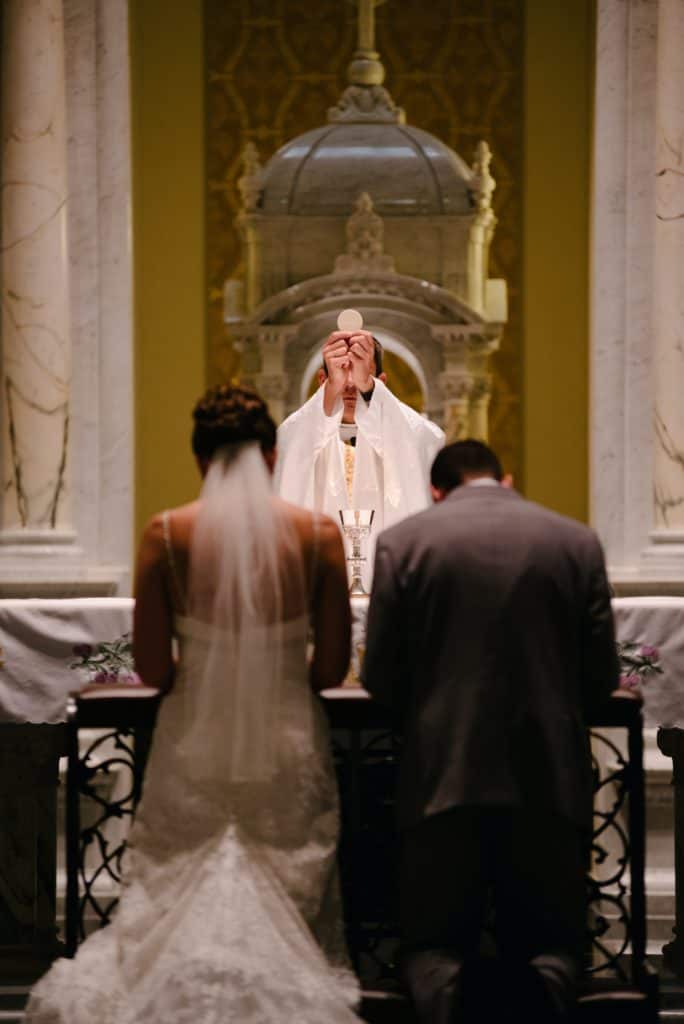
In the Catholic Church there are Seven recognised Sacraments as having New Testament foundations through Jesus Christ:
- baptism, Eucharist, confirmation which form the Sacraments of Initiation.
- reconciliation, anointing of the sick (or Extreme Unction or Last Rites) which form the Sacraments of Healing; and
- Matrimony, holy orders which form the Sacraments of Service.
In addition, a Sacrament can be defined as:
“Ritual actions undertaken by the Christian Church that are understood as visible signs of invisible divine grace.
(Eugene R. Schlesinger, “Sacraments,” ed. John D. Barry et al., The Lexham Bible Dictionary, 2016).
Finally, keep in mind that a sacrament confers grace ‘ex opere operato’ is to assert in effect that the sacrament itself is an instrument of God, and that so long as the conditions of its institution are validly fulfilled, irrespective of the qualities or merits of the persons administering or receiving it, grace is conferred (Council of Trent (sess. 7, de sacramentis in genere, can. 8).
With the action of God through Grace, below is a summary of a Sacrament which involves three parts:
- A visible sign.
- Instituted by Christ.
- Gives Grace.
How do the Sacraments compare to natural life?
The sacramental life corresponds to the natural way and through this correspondence, God Grace is working on our human nature to perfect us at every step of life’s journey, leading us to be with Him in Heaven. However, there is one caveat to this, we need to correspond with the Graces and be pre-disposed to receive them. For example, through the reception of the Sacrament of Reconciliation (known as Penance and Confession) the penitent must be prepared (through an examination of conscience) to confess his/her sins and not withhold anything out of fear or embarrassment, otherwise the Sacrament is invalid. Therefore, the person is not opening themselves to receive God’s Grace through the sacrament.
Taking an example from life. Should you become ill and not present yourself to a medical practitioner i.e. a doctor, nor wish to divulge your entire illness, nor take the recommended medicine, then the chances of being cured or feeling better are drastically reduced. This is the same in the life of grace.
Just as we are born into life through birth, we enter the Christian life through Baptism.
Just as the body needs nourishment to live, grow, develop, and function, so does the soul that desires the living presence of Jesus within it through the Sacrament of Holy Communion.
Below is a table to illustrate this point:
| Natural Life | Grace perfects Human Nature |
| Birth | Baptism |
| Adulthood | Confirmation |
| Food | Eucharist |
| Sickness and Medicine | Reconciliation / Confession / Penance |
| Death and/or Illness | Anointing of the Sick or Extreme Unction or Last Rites |
| Bring forth children into the word | Matrimony |
| Bring souls to Heaven | Holy Orders |
Whilst the journey is there to take, make your peace with God and enter the Sacramental life. Should you not know how to achieve this, especially if you’re a non-practicing Catholic or a non-Catholic, speak to your local Catholic Priest for guidance.
How are the Sacraments administered?
The sacraments are administered through matter and form. These are necessary for each person to ensure that the recipient has received what each of the sacrament signifies and the graces efficacious for our salvation.
What is the Matter in a sacrament?
Matter is that material element, usually in things, that is within our sensibilities. For example, in the bread and wine used in the Sacrament of Eucharist; and the oil and water used in the Sacrament of Baptism.
What is the Form in a sacrament?

To complete and make the sacrament efficacious and valid, the form is necessary. These are the words used when administering the sacrament. Taking the bread and wine used during the Holy Mass and at the consecration that is. “This is my Body. This is my Blood. Do this in memory of me”, shows that the bread and wine are now transformed supernaturally and become the Body, Blood, Soul and Divinity of Jesus.
The same is applied in Baptism in which the water symbolises and actually cleanses the recipient soul, i.e. ‘I baptise you in the Name of the Father, and of the Son and of the Holy Spirit’.
The Priest during the Sacrament of Reconciliation, and through his words, ‘I absolve you from your sins …’, is the form that truly removes the sins of the penitent and places grace back into the soul. We are then truly assured of receiving God’s forgiveness and grace through the words of the Priest who acts in the person of Christ (in persona Christi) and another Christ (alter Christus).
The Sacraments are made up of two elements – Matter and Form.
It is therefore non-permissible for any one to change the matter and form of the sacraments, since they were instituted by Jesus Christ. To use anything other that what the Church states is the form and matter, is to render the sacrament as invalid.
How is a sacrament received?
A sacrament can be received validly and invalidly.
For a Sacrament to be received validly the proper matter and form needs to be applied to the recipient. The Sacrament when received validly causes grace immediately in the person. It is also contingent on the person receiving the sacrament to be predisposed. For example, a penitent receiving the Sacrament of Reconciliation will need to prepare by making an examination of conscience and tell the priest his or her sins both in kind and number, especially mortal (or grave) sins; recite the act of contrition and carry out the penance given by the priest.
An invalid sacrament means a sacrament never took place in the first instance. For example, a person being forced into a marriage against their will, constitutes a decree of nullity. A person withholding a mortal sin, and they are aware of the sin, constitutes an invalid confession.
Another example, which we have seen is where the words of baptism are replaced with, ‘We baptise you…” or “I baptise you in the name of the creator, the saviour and the sanctifier’. These are the incorrect form in baptism and would constitute an invalid baptism.
An invalid sacrament produces no supernatural reality in the recipient. It can have no good effect whatever, but only a bad one, since it is a mortal sin to receive a sacrament invalidly.
Do sacraments place a mark or character on the recipient?
The three sacraments of initiation – Baptism, Confirmation and Holy Orders place a seal or mark or character on the recipients’ souls. Hence these three sacraments can never be repeated.
The character in Baptism is that we are enabled to receive graces, divine things and opens the door of the soul through Sanctifying Grace and all Its’ properties to receive the other sacraments.
The character of Confirmation is that we are soldiers of Jesus Christ and the necessary graces and gifts to defend Jesus Christ and His Church.
The character of Holy Orders places a character of a man with the seal of a priest forever in the order of Melchizedek. The recipient has the character to administer the sacraments.
How many Sacraments are there?
The Catholic Church has defined that there are seven sacraments, and are divided into three main categories, these are:
Sacraments of Initiation
- Baptism.
- Confirmation.
- Holy Communion or Eucharist.
Sacraments of Healing
- Reconciliation or Confession or Penance.
- Extreme Unction or Anointing of the Sick.
NB: These five sacraments above are for the sanctification of the individual.
Sacraments of Service to the Community.
- Holy Orders.
- Holy Matrimony or Marriage.
Is there a central or most important sacrament?
The Catholic Church recognises that the source and summit of the Christian life as stated in the Catechism of the Catholic Church (CCC):
“The Eucharist is “the source and summit of the Christian life.” “The other sacraments, and indeed all ecclesiastical ministries and works of the apostolate, are bound up with the Eucharist and are oriented toward it. For in the blessed Eucharist is contained the whole spiritual good of the Church, namely Christ himself, our Pasch.” (CCC334).
All the other sacraments are bound up and orientated to the Eucharist.
In addition, and most importantly the Eucharist contains and is Christ Himself in His fullness – Body, Blood, Soul and Divinity.
Therefore, one is Baptised and receives Reconciliation to receive the Eucharis. A person continues to reconcile through life to receive the Eucharist, much like an ill person visiting a doctor to receive medicine for health. At the end of life, the dying or sick person receives Extreme Unction in a perfect way to be in the presence of Jesus Christ.
At one’s confirmation, the recipient receives the Holy Spirit along with the gifts to defend the Eucharist.
Through marriage, the couple bring forth children towards receiving and being supernaturally nourished through the Eucharist.
The sacrament of Holy Orders, the priest has the authority and supernatural power, to call upon the presence of Jesus during consecration at the Mass, to administer to the faithful who seek to receive and are worthy and predisposed. A Sacramental life is the perfect way to receive God’s grace, remain in His Grace and to prepare to meet Him when we take our last breath. Be in a State of Grace always for we are called to be ready to meet the Bridegroom.
